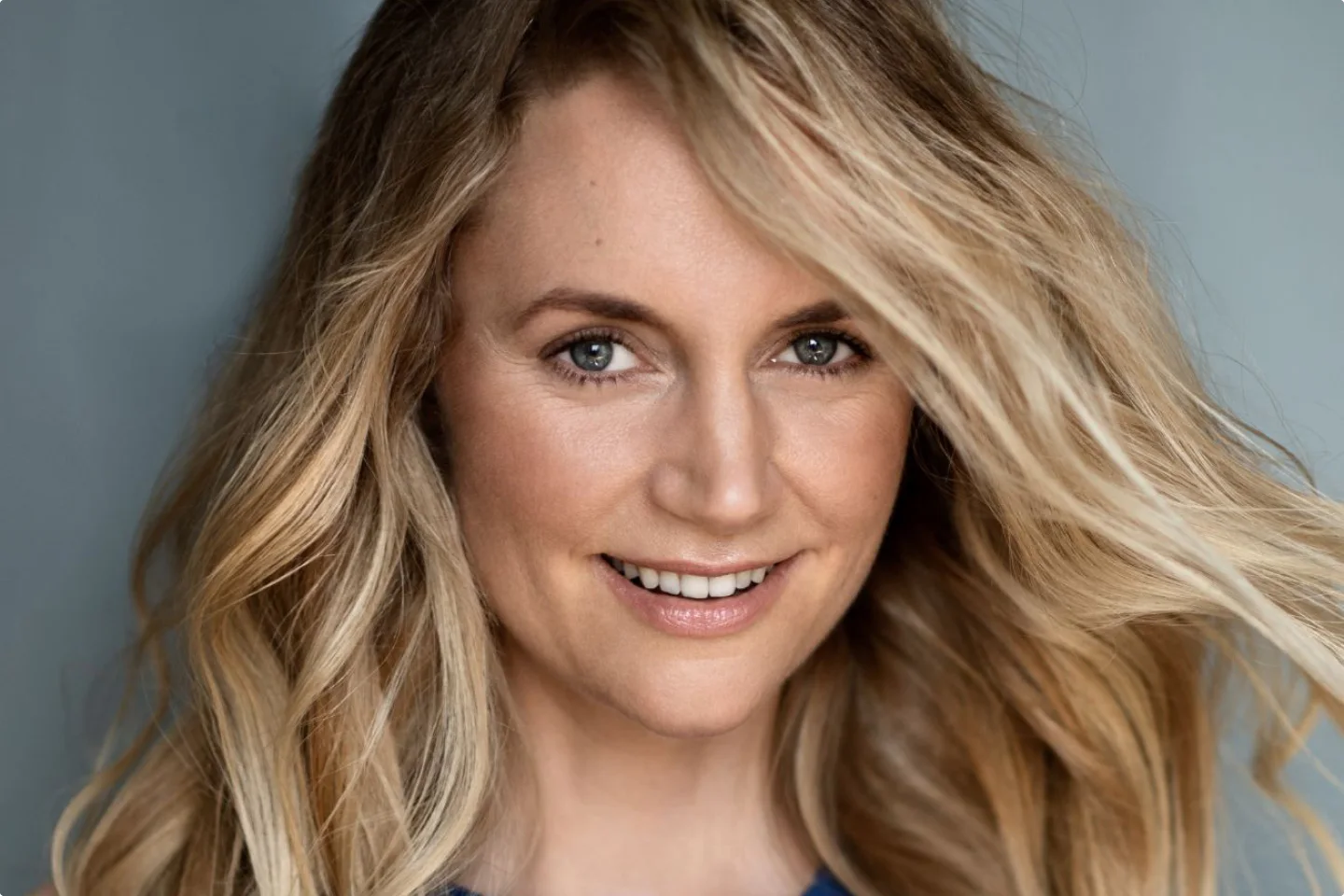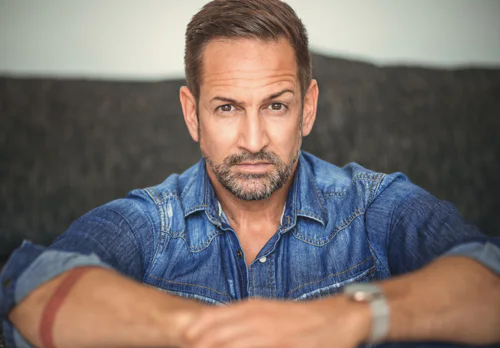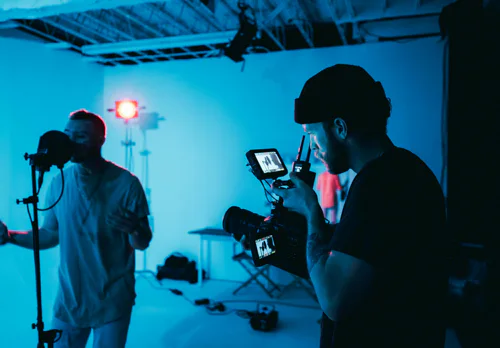What qualities should an actor have?
The first prerequisite for becoming an actor is a passion for language, music and movement, as it is not uncommon for all three things to be combined and required in one job. You should enjoy exploring these three areas, trying them out and constantly reinventing yourself.
Being flexible is the be-all and end-all. For example, ensemble casts at the theater often change after just one season, musicals tour the whole world and long-running film productions are constantly changing their location in order to get different shots in the can. Instead of being tied to one place, you should be prepared for a nomadic life.
You should also have a deep desire to be in front of the camera or on stage, to present yourself to the audience and inspire them.
When it comes to rehearsing certain roles, you should have a certain amount of body control, skill and concentration. This is a particular advantage when handling props such as weapons, practising fight scenes or memorizing choreography for a musical. A keen sense of observation and accuracy is another good quality for rehearsing texts and recognizing changes in facial expressions, gestures and language. Sensitivity enables actors to empathize with situations and convey them authentically. A good dose of creativity and imagination is also important in order to bring in your own interpretation of the role.
Furthermore, engagements are usually a "collective production process" in which teamwork and communication skills as well as interpersonal skills are indispensable.
In general, as an aspiring actor, you should have a thick skin and the talent to market yourself if you want to realize your dream of becoming an actor.
There is no magic formula for becoming a successful actor. However, talent, discipline and dedication are things that you should definitely have in order to gain a foothold in the industry.
What vocational training is required?
In theory, you don't need any training to work as an actor. However, the bad news is that an actor without training who has been in the business successfully for a long time is a rare exception.
There are different ways to qualify as an actor. The classic route leads applicants via a three to four-year drama school. These accept young people aged at least 17 who have completed their secondary school leaving certificate. There are 19 state drama schools in German-speaking countries, 13 of which are based in Germany.
The Ernst Busch Academy of Dramatic Arts in Berlin and the Otto Falckenberg School in Munich, for example, have an excellent reputation. There are also numerous private drama schools. However, it is easier for graduates of a state school to enter the industry, as the schools themselves are well networked and can get (former) students engagements. In addition, there are no training fees at state drama schools, as applicants are selected purely on the basis of their talent.
Places at state drama schools are of course highly coveted, but very limited. Every year, over 5,000 aspiring actors apply for around 300 places at state drama schools. No wonder that demanding entrance examinations are the result. The more prestigious the school, the tougher the admissions process. Many applicants wander from one drama school to the next until they are finally accepted or end up at an expensive private drama school.
Everyone should decide for themselves which acting school is ultimately the right one, as each school has its own focus (e.g. theater, film and television, musicals, dance) and teaches different modules with varying degrees of intensity (e.g. stage, scene and camera work, improvisation, speaking technique, dance and singing).
School-based training not only costs a lot of time, but also money. Not everyone is able to finance themselves for so long. This is why there are alternatives that do not necessarily require drama school. Popular solutions to avoid the long school years and keep costs under control are short workshops or one-to-one lessons with experienced acting teachers and coaches who pass on their knowledge. This form of training also enables aspiring actors to take part in acting classes in the evenings or at weekends - alongside other gainful employment. Unfortunately, it is not possible to obtain a recognized qualification.
Caution is also advised at this point. To avoid being ripped off, you should look at the CV of the acting teacher/coach and ask friends and acquaintances for recommendations to be on the safe side.
If you are absolutely convinced of your talent and trust your skills, you can venture into the fray without any training and apply for various acting jobs. In this case, you usually start with small extras, bit parts or supporting roles for which acting training is not a prerequisite. Ideally, you should gain as much experience as possible in front of the camera, the audience and on stage in order to optimize your showreel and be prepared for the big jobs. Those who have gained a foothold in the industry as career changers were sometimes simply in the right place at the right time.
What do I have to do to be accepted at a drama school?
As a rule, applicants first submit a written application. If this is successful, the young people are invited to audition. Schools often announce in advance which roles the applicants can prepare for and which passages are to be performed. Schools often also offer audition preparation courses.
Preparation
Written application:
First of all, it is absolutely essential to find out about application deadlines and adhere to them. You should also find out what is required as part of an application: Letter of motivation, CV, photos, demo videos/showreels and voice samples? You can also save yourself a lot of time if you clarify in advance whether you meet the requirements or prerequisites.
Rehearse the audition roles:
To get a place at an acting school, there's no getting around an entrance exam. It is generally a good idea to choose two or three different audition roles that are as different from each other as possible, but that best express your respective strengths. The roles should trigger something in you, touch you so that you can identify with them and feel the urge to want to play this role. Because only an authentic performance is convincing!
Focus intensively on yourself and your chosen role, pay attention only to yourself and believe in yourself. According to the experts, this is the best way to go.
It also makes sense to think about your unique selling point - why am I the right person? What makes me special? What added value do I bring to the school? - and live this to the full on site.
Entrance examination
Even if you have already submitted your written application, bring your documents to the entrance exam updated and neatly organized. This shows that you are not only thinking ahead, but are also well organized.
There is a simple answer to one of the most agonizing questions: "What do I wear?". Wear what you feel comfortable in. Dress neatly, tidily and pragmatically. There's nothing worse than having to show off your dancing skills in addition to your acting skills, but unfortunately wearing jeans that are too tight and bulky.
The first test is to be on the spot on time. Show your future instructors that you can be relied upon. Check out the route in advance and plan time for any traffic jams, train delays or queues on site, for example at registration.
Also, be prepared to be able to improvise at the drop of a hat. If applicants state that they can do something specific (e.g. singing, dancing, foreign languages, dialects, etc.), they have to prove it. It is therefore not uncommon for casting directors to ask applicants to dance something on the spot, for example. So here's our advice: no matter what skills you have, have something in your repertoire so that you can react spontaneously.
Finally, you can show live what talent, skills and previous knowledge you already have.
On the day of the audition, the main thing is to keep calm and stay true to yourself! Don't let others drive you crazy and never let your anger or other moods show. Always remain friendly and respectful and show your strength as a team player. This is what counts when working together and is very important in the arts industry.
How do I convince people in the application process for a first job?
Basically, the same or similar rules apply as for applications to drama schools. However, you can sense a significantly higher level of professionalism at all levels.
At this point, we would just like to make a few additions to what we have said above.
As a written application, you now send a carefully compiled "up to date" sedcard. This contains a brief summary of all the important information as well as current photos (e.g. a different haircut/color is a no-go), demo videos/showreels and voice samples. They can either be printed out to send by post or sent digitally by e-mail.
At auditions, the role you are auditioning for is usually already known. You should prepare for these as well as you can until you can recite the text by heart in your sleep. However, it is an advantage if you still have one or two audition roles in your repertoire in case you are asked to give another performance. It may well be that you don't fit the advertised role, but you have impressed the casting directors so much that they hire you for another role or invite you to the next audition.
If you are offered a role, you should ask for time to think about it and take the contract home with you - never sign it on the spot. This will save you expensive and unpleasant consequences later on. Read through the contract again at your leisure and ask another trustworthy person to check it (e.g. a lawyer) before you make a decision. You should only sign contracts whose terms you agree with 100%.
Finally, an important tip: avoid dubious castings. But how do you know when it's a fraudulent job offer?
Here are a few tips on how to spot scammers in job advertisements or invitations:
Do not give exact details of the client
Castings never take place at private addresses or in a hotel room
"I'll make you a star.", "I'll take you to the top." - Empty promise, seems unprofessional and untrustworthy
Many spelling mistakes
Demands for money from the client regarding casting fees - where do you find such things?























